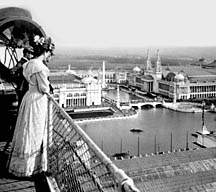|
Chicago's story is next — Originally published in Current,
Sept. 10, 2001 A four-hour series on how a swampy outpost for fur traders became the quintessentially American metropolis will be the next city biography presented by American Experience. Chicago: City of the Century is based on Donald Miller's book of the same title. It airs on PBS in 2002-03. Unlike the panoramic treatment that Ric Burns gave to three centuries of New York history in his series that concludes on PBS Oct. 1 [2001], the Second City bio focuses on Chicago's transformation over a single century. "This is not the complete history of Chicago. This is a story about its rise," explained Mark Samels, senior producer of American Experience at WGBH, Boston. Miller used this framework to good effect in his 1997 book, and it provides a "very satisfying and contained story line," Samels added. The producer introduces us to a character who arrives in the frontier town in the early 1800s and adopts the lifestyle of fur traders and Native Americans; at the series' end, the man celebrates the World's Columbian Exposition in a pinstripe suit. The exposition — the World's Fair of 1893 — is the "seminal point" in the ascent of Chicago, when it presents itself as a world-class city, said Mary Beth Hughes, executive producer for co-producing station WTTW in Chicago. "The past, present and future come together in one time and one place, culminating and crystallizing the issues of an age that make Chicago the city of the century." "This is the capital of the great Middle America, and it's very different from New York, which, being on the East Coast, is oriented to Europe," said Samels. Foreign visitors to Chicago in the 19th century often remarked "that this is something different — this is something uniquely American. All this building and all these railroads coming together midst all this prairie and this giant lake and corn and wheat fields that stretch out forever." The series concludes with Chicago's triumphant World Fair, but there are lots of elements to the history that aren't so happy: a cholera epidemic, overcrowding, the Chicago Fire and "enormous labor problems," added Samels. "Any time there's opportunity, there's struggle." The story of Chicago has "vast opportunities and vast struggle." Austin Hoyt, whose last major documentary for American Experience was MacArthur, is producer of City of the Century, which is in post-production. The Chicago Historical Society opened its archives for the project and is a partner in the co-production. American Experience intends to continue developing city biographies. Producers have a "horizontal list of eight to 10 cities" with histories they'd like to re-tell on screen, said Samels. "It takes a set of circumstances, frankly, to allow these to come to fruition." In the case of Chicago, it was Miller's book that "really got this going." "He presented a conceptual framework of what makes Chicago a major city, and a distinctly American city." WTTW and the Chicago Historical Society are both "strong partners" in the co-production. |
The metropolis of the plains announced its ambitions at the 1893 World's Fair. (Rooftop photo: Chicago Historical Society.) |


